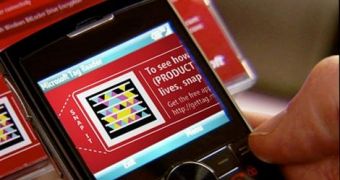Google is late to the mobile tagging game, lagging Microsoft, and as such, the Mountain View-based search giant has taken matters into its own hands, and is sending QR code stickers to many small businesses, whether they want them or not. The idea is that users with smartphones can take pictures of the QR barcodes with mobile device camera and immediately access a variety of information on a specific business, including reviews and discounts, via the Internet. But with the latest efforts, Google is simply the Jehovah’s Witness of the mobile tagging world, knocking on doors and attempting to artificially drive the adoption of QR code stickers by business that might have never heard of the company’s initiative, let alone indicate any sort of interest of “converting.”
Even if it’s following in the Redmond company’s footsteps, Google is not bringing any sort of innovation to the table. In fact, the search giant is relying on old and restrictive standard, whereas Microsoft has introduced since the start of 2009 its very own breed of QR code technology, labeled Microsoft Tag. A spokesperson for Microsoft referred to Tag as the next leap forward in barcode scanning technology, as an indication showing why partners are adopting Microsoft tag.
And the software giant has every right to applaud Microsoft Tag. Its own bar code technology simply has more to offer businesses compared to the old QR code format. Microsoft Tag is capable of storing more information, is more dynamic, and most importantly, it is extremely flexible, being highly customizable and offering more user choice.
Here are the main benefits of Microsoft Tag, as shared by the company:
“- Tags are perfect for small businesses; because they’re so easy to set up, businesses can easily use them to do everything from sharing content like menus or reviews, to dialing your business phone automatically, to sharing promotions and offers with customers. - The Tag itself is dynamic—able to point to any mobile web page you create. Other barcode technologies force you into pointing to a specific website that you cannot change. For example—you can have the same Tag permanently posted in your store, pointing to a coupon which changes monthly. - Businesses want to use their Tag in all kinds of places- in print ads, on business cards, on menus, even on coasters. Because Tags can be one quarter the size of other two dimensional barcodes, it’s versatile enough to go wherever they want to use it. - Tag offers businesses the opportunity to customize their Tags, something you can’t do with other technologies. In many cases, they’ve spent a great deal of time and resources developing a branded image that they want to use. With Tag, businesses can use their color logo, for example, as the Tag background- they’re not limited to black and white barcodes that lack individuality.”
Microsoft Tag functions in accordance with the same principles as the Google QR code stickers. Camera phone users can download a small client that installs on their device, and can take pictures of tags, accessing additional information on their devices. The Microsoft Tag Beta client is currently available for the following phones and mobile platforms: Android, Blackberry, iPhone, Java 2 Micro Edition, PalmOS, Symbian S60, Symbian S60 1st Edit, Symbian S60 2nd Edit, Symbian S60 3rd Edit, Symbian S60 5th Edit, Windows Mobile, and Windows Phone. And the best thing about it is the fact that it’s completely free, unlike the some of the QR readers for Google’s stickers.
There’s no telling whether over 100,000 local businesses in the U.S. that have been deemed "Favorite Places on Google" and been sent window decals, will actually accept to advertise Google on their windows simply because the company has sent them a free sticker. In addition, the complete lack of control over the info shared with end users via the QR stickers is bound to turn some businesses off. And although some businesses will go along with Google, simply because of the association with the number 1 search engine worldwide, fact is that those that take into consideration the advantages of Microsoft tag will select the later.
Microsoft hasn’t shared any data on the actual adoption of its bar code technology, but revealed that “is seeing more and more interest in Tag, with adoption across more industries across the globe: Partners like GVB in Amsterdam are using Tag to let their public transportation customers know about arrival and departure times for trams and buses. Over at Condé Nast, you’ll find Tag woven throughout the editorial features in Golf Digest as a way to share more content and videos with readers. In Italy, businesses are starting to integrate Tags right into their yellow page ads as a way to help consumers learn more about their products and services. And major brands like Ford and Dodge are starting to integrate Tags into their print ads, brochures, and other content,” the Microsoft representative told Softpedia.

 14 DAY TRIAL //
14 DAY TRIAL //